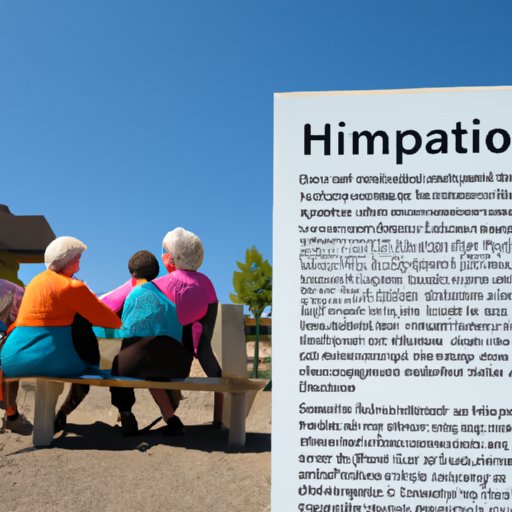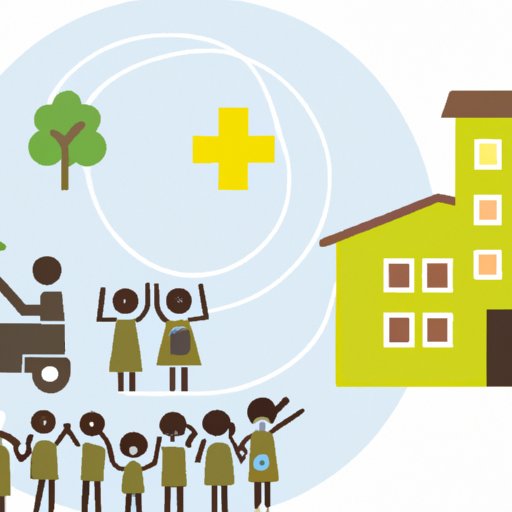Introduction
Community health nursing (CHN) is a specialized field of nursing dedicated to improving the health of individuals and communities through health promotion, disease prevention, and health education. The goal of CHN is to promote health equity and reduce disparities among different populations. This article will explore the role of CHN in promoting public health, examining the scope of practice, investigating innovative strategies for delivering care in underserved communities, understanding the unique challenges associated with the role, exploring the impact of CHN on population health outcomes, and highlighting successful case studies of CHN making a difference.
Exploring the Role of Community Health Nursing in Promoting Public Health
Public health is a broad term used to describe efforts to improve the health of entire populations. These efforts are focused on preventing disease and promoting healthy lifestyles through education, policy, and legislation. Public health issues are often complex and challenging to address, requiring an interdisciplinary approach that includes healthcare professionals, social workers, educators, and policymakers.
Community health nurses play a vital role in promoting public health. They are responsible for providing health services to individuals, families, and communities, as well as advocating on behalf of their patients. CHN may provide direct care and health education, conduct screenings and assessments, develop treatment plans, and refer patients to other healthcare providers. Additionally, they may be involved in community outreach activities such as providing health information at schools or community centers.
The benefits of public health promotion through CHN are numerous. By providing access to health care services, CHN can help to reduce the burden of disease and improve overall health outcomes. Additionally, CHN can provide education and support to individuals and families to encourage healthy behaviors, such as regular physical activity and healthy eating. Finally, CHN can help to identify and address public health issues that may not be visible on the surface, such as poverty, food insecurity, and lack of access to healthcare.

Examining the Scope of Practice for Community Health Nurses
The scope of practice for CHN is wide-ranging and includes a variety of care delivery methods. CHNs typically provide direct patient care, including physical examinations, diagnosis, and treatment. They may also provide health education and counseling, refer patients to other healthcare providers, coordinate care between providers, and advocate on behalf of their patients.
In order to become a CHN, individuals must complete specialized training and certification. In most states, CHNs must have a bachelor’s degree in nursing and pass the National Council Licensure Examination (NCLEX). Additionally, they must meet state-specific licensing and credentialing standards, which vary by state. Once certified, CHNs can pursue further specialization in a variety of areas, such as maternal and child health, geriatrics, mental health, and community health.
Investigating Innovative Strategies for Delivering Care in Underserved Communities
CHN often work in underserved communities where access to healthcare is limited. To meet the needs of these populations, CHN must employ innovative strategies for delivering care. These strategies may include using mobile health clinics, telehealth technology, and community health workers to provide care in remote areas. Additionally, CHN may partner with local organizations and government agencies to ensure that all individuals have access to quality healthcare.
Providing care in underserved communities presents both challenges and opportunities. On one hand, CHN must contend with resources constraints, language barriers, and cultural differences. On the other hand, they have the opportunity to make a real difference in the lives of those they serve. Through their work, CHN can help to reduce health disparities and improve overall public health outcomes.
Understanding the Unique Challenges Associated with Community Health Nursing
The role of CHN is physically and mentally demanding. CHN must balance the physical demands of caring for multiple patients with the mental and emotional strain of dealing with complex cases. Additionally, CHN may face cultural, socioeconomic, and educational disparities among their patients, which can make providing care more difficult.
Furthermore, CHN often work in resource-poor settings with limited access to supplies, equipment, and other necessary resources. This lack of resources can lead to burnout and decreased job satisfaction, making it difficult for CHN to stay motivated and continue providing quality care.

Exploring the Impact of Community Health Nursing on Population Health Outcomes
The effectiveness of CHN interventions can be measured by assessing population health outcomes. Evidence-based practices, such as screening and early intervention, can be used to improve health outcomes for individuals and communities. Additionally, evaluation of outcomes is essential to ensure that CHN interventions are effective and that resources are being used efficiently.
By measuring population health outcomes, CHN can assess the impact of their work and identify areas for improvement. This type of data can be used to inform decision-making and guide future initiatives.

Highlighting Successful Case Studies of Community Health Nurses Making a Difference
There are many inspiring stories of CHN making a difference in their communities. For example, CHN have been instrumental in developing school-based health programs, providing home care services to elderly and disabled populations, and leading initiatives to reduce infant mortality rates. These initiatives demonstrate the power of CHN to create positive change in their communities.
Additionally, there are countless stories of individual CHN making a difference in the lives of their patients. These stories highlight the importance of CHN in providing quality care and improving public health outcomes.
Conclusion
Community health nursing is a specialized field of nursing dedicated to improving the health of individuals and communities. CHN provide direct care and health education, advocate on behalf of their patients, and work to reduce health disparities. The scope of practice for CHN is wide-ranging, and they must use innovative strategies for delivering care in underserved communities. Additionally, CHN face unique challenges, such as physical and mental demands, cultural differences, and lack of resources. Finally, CHN can measure the impact of their work by assessing population health outcomes and highlighting successful case studies of CHN making a difference.
CHN play a vital role in promoting public health, and their work is essential to creating a healthier world. We must continue to recognize and celebrate the contributions of CHN, and work together to ensure that all individuals have access to quality healthcare.
(Note: Is this article not meeting your expectations? Do you have knowledge or insights to share? Unlock new opportunities and expand your reach by joining our authors team. Click Registration to join us and share your expertise with our readers.)
